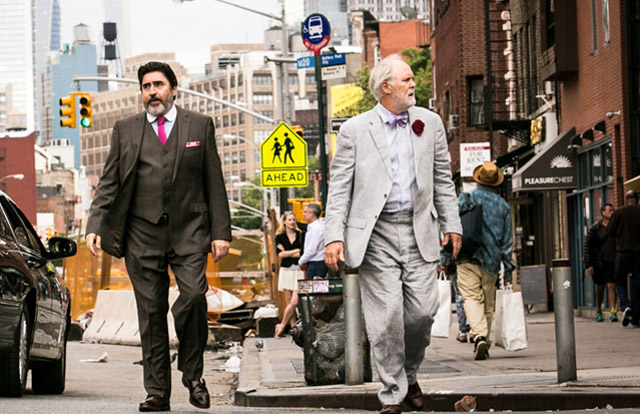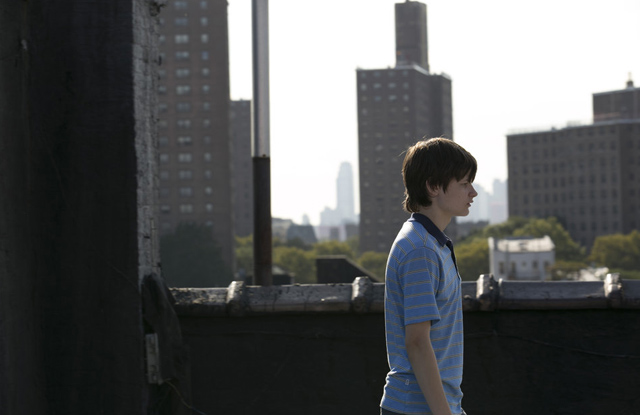CHICAGO – In anticipation of the scariest week of the year, HollywoodChicago.com launches its 2024 Movie Gifts series, which will suggest DVDs and collections for holiday giving.
Celebrating the Ordinary Couple in ‘Love is Strange’
 Rating: 4.0/5.0 |
CHICAGO – It is a time, and the time is now. Leave it to filmmaker Ira Sachs to break a barrier simply by having the right timing. Exploring a longtime gay couple, right at the cusp of their now-legal marriage, opens the door to an odd series of ordinary circumstances in “Love is Strange.”
The karma of what the marriage does is the main theme of the film, as employment, family relationships and housing are affected by the opening of the nuptial Pandora’s box. That is not to say the event itself is controversial, but what happens when one thing leads to another afterward, is so simple and human. The acting in the film – led by Alfred Molina and John Lithgow as the couple – expresses a truth about how all can seem well when everything is aligned, and how discombobulated our souls become when that normalcy is challenged. The twist is that the challenge has nothing to do with attitudes toward the gay couple, and more to do with the everyday foibles of human life.
Ben (Lithgow) and George (Molina) have been together for 39 years. In accordance with a new era in their lives, they decide to get married. This pleases their relatives, like Ben’s sister Kate (Marisa Tomei), nephew Joey (Charlie Tahan) and other assorted friends who celebrate their wedding day. An errant picture on Facebook begins a new realm of fate.

Everybody’s Talking: George (Alfred Molina) and Ben (John Lithgow) in ‘Love is Strange’
Photo credit: Sony Pictures Classics
George works as a choir master for a Catholic high school. When the priest principal sees pictures of the marriage online, the Church has no choice but to fire him. This causes a rift in the couple’s finances, which eventually forces them to move to separate quarters in space-challenged New York City, until they can secure new housing. Ben moves to Kate’s house, and George moves in with some friends. The newlyweds are separated for the first time in their lives.
What is most impressive is the sheer ordinariness of the situation, and the notion that karma has laughed because the situation occurred as a result of their legal marriage. Ben and George are simply old men taking up space in their temporary residences. This twist is quite effective in the context of the issue, as in no matter your orientation or marriage status in that realm, the piper still has to be paid.
Lithgow and Molina have almost perfect chemistry as the couple – they are able to wear the cloak of the long-term relationship with ease. Their resignation to the fate, their slog through housing bureaucracy in New York City and the wearing out of their welcomes with their housemates have a quality of destiny to it, even though the characters themselves would probably scoff at such a notion. There is only one time they crack the veneer of acceptance, and even that is a temporary frustration that gets them back on their tracks.
Writer/director Sachs – and his co-writer Mauricio Zacharias – create a tribute to a successful gay couple, survivors of the complexities of the last generation. They are fully realized human beings who are not driven by political activism, as much as how whole they are as an typical couple. As gay men of a certain age and era, they’ve made it to this era refreshingly nonchalant about the atmosphere they lived through previously, even though in their touched-upon back story they have suffered losses along the way.

Adolescent Angst: Charlie Tahan is Joey in ‘Love is Strange’
Photo credit: Sony Pictures Classics
There is also a delicate art about how director Sachs handles transitions. His languid shot selections are contemplative, and reveals a New York City that is of a few streets and neighborhoods. The character of Joey goes through some severe teenage angst, and gets shown the light both literally and figuratively. The characters are treated fairly in their reactions to Ben and George’s lack of housing, and the gamut of flawed human emotion is applied to the situation, as opposed to a tempting feel good result.
This is about life as we know it in 2014. The bitter with the sweet in dealing with the realities of change, but not giving up through the strength of relationships. Ben and George have an epic love, but they also have an ordinary one, and that is as important to their “rights” in the gay marriage debate as any other argument.
 | By PATRICK McDONALD |


